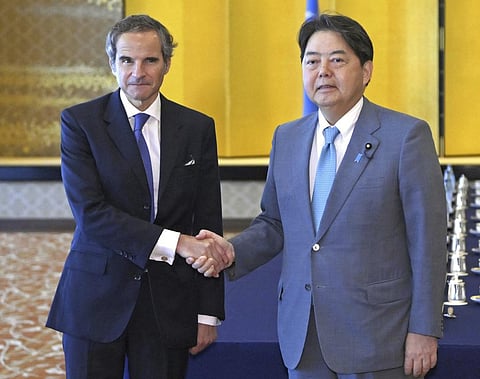

TOMIOKA: The United Nations nuclear chief was to visit Japan's tsunami-wrecked nuclear power plant Wednesday after the agency affirmed the safety of a contentious plan to release treated radioactive water into the sea.
On his way to the Fukushima Daiichi plant, a highlight of his four-day Japan visit, International Atomic Energy Agency chief Rafael Mariano Grossi joined a meeting of government and utility officials, as well as local mayors and fishing association leaders, and stressed the continuous presence of this agency throughout the water discharge to ensure safety and address the residents' concerns.
"What is happening is not something exceptional, some strange plan that has been devised only to be applied here, and sold to you," Grossi said in his opening remarks in Iwaki, about 40 kilometers (25 miles) south of the plant. "This is, as certified by the IAEA, the general practice that is agreed by and observed in many, many places all over the world."
For people's doubts and concerns, "I must admit I don't have a magic wand … but we do have one thing," Grossi said. "We are going to stay here with you for decades to come until the last drop of the water which is accumulated around the reactor has been safely discharged."
That means IAEA will be reviewing, inspecting, checking the validity of the plan in the decades to come, he said.
The IAEA, in its final report released Tuesday, concluded the plan to release the wastewater — which would be significantly diluted but still have some radioactivity — meets international standards, and its environmental and health impact would be negligible.
But local fishing organizations have rejected the plan because they worry that their reputation will be damaged even if their catch isn't contaminated. It is also opposed by groups in South Korea, China and some Pacific Island nations due to safety concerns and political reasons.
Fukushima's fisheries association adopted a resolution on June 30 to reaffirm their rejection to the treated water discharge plan.
During Wednesday's meeting, Fukushima fishery association chief Tetsu Nozaki urged government officials "to remember that the treated water plan is pushed forward despite our opposition."
Iwaki Mayor Hiroyuki Uchida asked the government to prioritize a thorough explanation rather than their release timeline.
Grossi told a news conference Tuesday, "I believe in transparency, I believe in open dialogue and I believe in the validity of the exercise we are carrying out."
The report is a "comprehensive, neutral, objective, scientifically sound evaluation," Grossi said. "We are very confident about it."
A massive earthquake and tsunami on March 11, 2011, destroyed the Fukushima Daiichi plant's cooling systems, causing three reactors to melt and contaminating their cooling water, which has leaked continuously. The water is collected, treated and stored in about 1,000 tanks, which will reach their capacity in early 2024.
The government and the plant operator, Tokyo Electric Power Company Holdings, say the water must be removed to prevent any accidental leaks and make room for the plant's decommissioning.
Japanese regulators finished their final safety inspection last week, and TEPCO is expected to get the permit for the release in coming days. It could then begin gradually discharging the water any time through an undersea tunnel from the plant to a Pacific Ocean location 1 kilometer (1,000 yards) offshore. But the start date is undecided due to protests at home and abroad.
China doubled down on its objections to the release in a statement late Tuesday, saying the IAEA report failed to reflect all views and its conclusions were "largely limited and incomplete." It accused Japan of treating the Pacific Ocean as a sewer.
"We once again urge the Japanese side to stop its ocean discharge plan, and earnestly dispose of the nuclear-contaminated water in a science-based, safe and transparent manner. If Japan insists on going ahead with the plan, it will have to bear all the consequences arising from this," the Chinese Foreign Ministry said in the statement.
Japan should work with the IAEA to establish a "long-term international monitoring mechanism that would involve stakeholders including Japan's neighboring countries," the ministry said.
Grossi said treating, diluting and gradually releasing the wastewater is a proven method widely used in other countries — including China, South Korea, the United States and France — to dispose of water containing certain radionuclides from nuclear plants.
Much of the Fukushima wastewater contains cesium and other radionuclides, but it will be filtered further to bring it below international standards for all but tritium, which is inseparable from water. It then will be diluted by 100 times with seawater before it is released.
Some scientists say the impact of long-term, low-dose exposure to radionuclides remains unknown and urge a delay in the release. Others say the discharge plan is safe but call for more transparency in sampling and monitoring.
Prime Minister Fumio Kishida, after meeting with Grossi, said Japan will continue to provide "detailed explanations based on scientific evidence with a high degree of transparency both domestically and internationally."
Grossi is also expected to visit South Korea, New Zealand and the Cook Islands after his visit to Japan to ease concerns there.